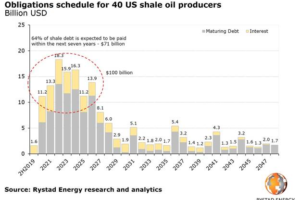Jan
06
2020
With all that is going on in Iraq and Iran over the weekend, it would be hard to focus on anything else but that’s exactly what we are going to do (for more on Iran, listen to the 10 minute “Hottakeover Your Commute” podcast, released every Sunday).
Hedging! The boring topic that no management team wants to talk about for fear of taking away levered upside. But first, we must lay out some assumptions:
2020 budget oil price: $55;
Royalties:...
Oct
11
2019
This week’s series happened to coincide
with two previously arranged speaking engagements and so in an odd swing of
timing, my message of Gloom hit the road. Perhaps my parents said it best last
night: “You are really depressing.”
Look. I want to be
wrong. I want prices to go up; I want balance sheets to be better; I want to
have a happy message to tell people about the future of the industry. But...
This is a balance
sheet crisis and means that a meeting of...
Oct
10
2019
In the introduction to the series on
Monday, I argued that the fall in prices has been a distraction that masked the
real issue- which is balance sheets. Low interest rates on the heels of
the 2008 financial crisis, coupled with historically high commodity prices led
to a huge liquidity infusion into O&G balance sheets. Today, we
examine magnitude of the issue.
With thanks to my
new friend Michael Kelly, CFA, Seaport saved me the effort of manually creating
all the comps for public E&Ps to make...
Oct
09
2019
Hey, Kid, Come Here...I got something for you.
All your peers are doing it- you wanna try? You can pay me later. Wait until
you see what it does to your equity! You’re gonna be so rich!! You know you
want to...
Earnings BEFORE... Interest. We left off yday
with EP: They moved quickly in ‘16, cut capex and generated net positive FCF.
But alas, every positive step was eaten by interest and so the debt remained.
Flashback: in Feb ‘14 when oil was...
Oct
08
2019
Let’s start with my favorite question: is shale a
Ponzi scheme? 100% no. But like the answer you give your doctor when they say
“how many drinks do you have a week?”- the truth may be somewhat different than
you like to believe. (FYI - my doctor friends tell me they multiple the number
you say by 3).
With a b factor of 1.3, you produce approximately
30% of the total reserves in the first 12 months.; The AVG US oil shale well
produces 16...
Oct
07
2019
The origin of the ‘08 financial crisis was
people’s desire to own homes; The CAUSE of the crisis was the debt ON DEBT that
was put there.
Throughout history, when the ability to generate
real returns dry up, bankers get creative. In ‘08, all this origination meant
lots of fees and all the leverage meant higher equity returns (and fees). But
when the music stopped, it almost brought the economy down with it.
In the past 10 months I have focused my attention
on the...
May
17
2019
A help wanted ad I see coming in the very near future...
WANTED: Debt investors need deeply experienced workout group to help us not
lose all the money we invested in horrible companies with tragic balance
sheets. Oh, and did we mention the assets aren’t good so you can’t drill or
sell your way out of the problem.
Required skills: must be able to take a beating all day every day; must take
the blame for our horrible investment so we can blame you when...
Jan
28
2019
I wrestled all day yesterday with the subject of corporate share buybacks.
Are they “good”? Are they “bad”? What does that even mean? You can spin
yourself in circles debating the impact on share prices, companies and
shareholders. And then I came across the chart below.
To state the extremely obvious - the thing that bankrupts companies are not
share prices going to zero - it’s not being able to pay your debt. Executing
buybacks and not paying down corporate debt may jack earnings per...




